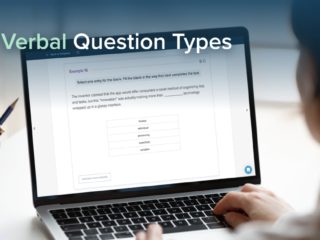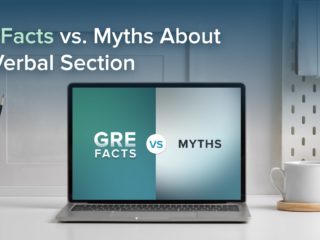| Getting your Trinity Audio player ready... |
People planning to take the GRE often wonder, “How difficult is GRE Verbal?” The level of difficulty of the GRE Quantitative Reasoning section may seem straightforward to assess. In contrast, assessments of the Verbal Reasoning section difficulty can vary widely. One test-taker will report having to prepare for months and months on end to perform well. Another will report finding GRE Verbal relatively easy.
So, what’s the truth about GRE Verbal? In this article, we’ll consider what makes GRE Verbal difficult or not so difficult, and assess its difficulty overall. We’ll also answer some common questions about how difficult the Verbal sections are and compare the difficulty of GRE Verbal questions to similar questions on other tests.
Here are all the topics we’ll cover:
- How Many Questions Are in the GRE Verbal Section?
- Does GRE Verbal Get Harder If You Do Well?
- The Basics of GRE Verbal Questions
- How Difficult Are Text Completion and Sentence Equivalence?
- How Difficult Is Reading Comprehension?
- How Difficult Is Critical Reasoning?
- How Hard Is It to Get 160 on the GRE Verbal Section?
- Why Is GRE Verbal So Hard?
- Is GRE Verbal Harder Than GMAT Verbal?
- How Long Does It Take to Prepare for GRE Verbal?
- Key Takeaways: How Difficult Is GRE Verbal?
- What’s Next?
Let’s begin by reviewing how many Verbal questions you’ll face on the GRE.
How Many Questions Are in the GRE Verbal Section?
On the GRE, Verbal questions appear in 2 sections. The first Verbal Reasoning section contains 12 questions that you have 18 minutes to answer. The second section contains 15 questions that you have 23 minutes to answer.
So, in total, you’ll see 27 Verbal questions on the GRE, and you’ll have roughly 1.5 minutes to complete each question. Thus, GRE Verbal time-management is one of the challenges of the exam. (Check out this article to learn more about how many questions are on the GRE.)
Additionally, depending on how you do in the first Verbal section, the questions you see in the second section may be more challenging. Let’s discuss.
KEY FACT:
The GRE presents a total of 27 Verbal questions split into 2 sections of 12 and 15 questions, respectively.
Does GRE Verbal Get Harder If You Do Well?
A key aspect of how the GRE is structured is that it is section-adaptive. So, your performance on the first GRE Verbal section affects the difficulty level of the second Verbal section. Let’s get into the details.
The Verbal questions presented in the first Verbal section are, overall, of medium-level difficulty. If you perform well on those questions, then the second Verbal section will present questions that are harder overall.
Conversely, if you perform poorly on the first Verbal section, the second Verbal section will present questions that are easier overall.
If your performance is mixed or average on the first Verbal section, you’ll see questions that are, overall, still medium-level in the second Verbal section.
So, technically GRE Verbal does get harder if you do well.
KEY FACT:
Your performance on the first GRE Verbal section affects the difficulty level of the second Verbal section.
Now that we understand how the structure of the GRE plays into the test’s difficulty, let’s discuss the GRE Verbal question types you’ll face.
The Basics of GRE Verbal Questions
According to ETS, the maker of the GRE, the Verbal section of the GRE tests the following skills:
- analyzing and evaluating written material and synthesizing information obtained from it
- analyzing relationships among parts of sentences
- recognizing relationships among words and concepts
The Verbal section tests those skills by using 4 main types of questions:
- Text Completion (TC)
- Sentence Equivalence (SE)
- Reading Comprehension (RC)
- Critical Reasoning (a subtype of RC questions)
Text Completion questions ask which words most logically fill blanks in sentences. These questions may be a single sentence or multiple sentences and may contain either one blank or multiple blanks.
Sentence Equivalence questions also involve determining which words logically fill blanks. However, they have an additional dimension. The correct answers to Sentence Equivalence questions are pairs of words that produce sentences with equivalent meanings. So, there are always two correct answer choices in an SE question. These questions are always only a single sentence long, and each question contains only one blank.
Reading Comprehension questions ask about a variety of aspects of written passages, such as the main idea, details, purposes of sentences, and the meanings of words.
Critical Reasoning questions ask about a variety of aspects of arguments or scenarios presented in short passages. These aspects include assumptions on which arguments depend, ways that arguments could be weakened or strengthened, conclusions supported by arguments, and explanations for seemingly paradoxical situations.
KEY FACT:
There are 4 main GRE Verbal question types, 2 that require you to logically complete sentences and 2 that require you to analyze passages.
Having learned what the GRE Verbal questions are, let’s now assess their difficulty. We’ll start with Text Completion and Sentence Equivalence questions.
How Difficult Are Text Completion and Sentence Equivalence?
There are 3 main aspects of Text Completion and Sentence Equivalence that make these question types challenging for many GRE test-takers:
- the use of sophisticated vocabulary
- the need for careful analysis of sentences
- incorrect answers that take advantage of cognitive biases
Let’s delve into each of these challenges.
The Use of Sophisticated Vocabulary
The most obvious reason why Text Completion and Sentence Equivalence questions are challenging is that the answer choices often aren’t basic words. Rather, they’re fairly sophisticated words that would appear in scholarly articles. That is not to say that these words are very uncommon. They’re not. However, even an avid reader may be unsure of the definitions of many GRE words.
Of course, anyone preparing for the GRE test can study and learn these words. The thing is, for many students, GRE vocab prep involves studying hundreds, or even 1,000+, words in total in order to properly prepare for test day. Mastering so many words can be time-consuming and tedious, even for native speakers of English. (Our free GRE vocab list featuring approximately 1,200 words is a great resource to help!)
Additionally, to answer Sentence Equivalence questions efficiently, students must be able to not only quickly recall the definitions of individual words but also readily identify synonyms and antonyms.
Moreover, students often get so caught up in trying to learn as many vocabulary words as possible that they neglect other aspects of their GRE Verbal preparation, even aspects that are key for mastering these very question types. Let’s discuss.
KEY FACT:
For many students, GRE vocab prep involves studying hundreds, or even 1,000+, words, many of which are fairly sophisticated.
The Need for Careful Analysis of Sentences
Even TC and SE questions, which emphasize vocabulary knowledge, require other skills and knowledge to master. In fact, a core skill for correctly answering these questions is carefully analyzing sentences. And you need more than just a sharp eye for detail; you need to know what you’re looking for.
In other words, you must know what the crucial words and context clues in these sentences tend to be. Additionally, you must understand what they signify and be skilled in interpreting how they influence the sentence’s logic and meaning.
So, mastering TC and SE requires learning specific strategies and building these muscles during your GRE Verbal practice, in addition to memorizing vocab words.
KEY FACT:
Correctly answering TC and SE questions requires carefully analyzing sentences and quickly identifying crucial words and context clues.
Now, let’s look at one other major reason why these questions can be difficult: trap answers.
Trap Answers That Take Advantage of Cognitive Biases
Text Completion and Sentence Equivalence questions require us not only to find correct answers but also to avoid tempting incorrect ones. In particular, many TC and SE questions employ a particular kind of trap answer that can be very enticing: an answer that takes advantage of our cognitive biases.
This type of trap answer may present words that, in real life, are commonly associated with the topic or scenario discussed in the sentence(s) you must complete. They may fulfill stereotypes or “seem realistic.”
Of course, if you know to look out for these trap answers, you can become quite skilled at recognizing and avoiding them. However, learning to distinguish between answers that seem correct and those that actually are can take a bit of practice.
KEY FACT:
In TC and SE questions, incorrect answers often appear to be correct because they play on common cognitive biases.
So, as far as Text Completion and Sentence Equivalence are concerned, how difficult these questions are for you will depend in large part on the following:
- your level of vocabulary knowledge
- your eye for detail
- your understanding of context clues
- your ability to balance studying vocab with mastering strategies for efficiently answering these question types
Let’s now assess the difficulty of GRE Reading Comprehension.
How Difficult Is Reading Comprehension?
You may be relieved to hear that GRE Reading Comprehension passages aren’t very long — only 1 or 2 paragraphs. So, passage length is not one of the challenges of RC.
However, these short passages can be rather dense and complex. Plus, some passages may use figurative language that makes them more difficult to interpret. And, just like TC and SE sentences, RC passages can involve fairly sophisticated vocabulary. Some may involve scientific terminology or technical jargon. So, we certainly can’t assume that “short” means “easy” when it comes to RC passages.
One challenging feature of RC questions is that they require you to think about both “big picture” aspects of passages and specific details and to understand the interplay between the two. Additionally, incorrect answers in RC questions are often written in tricky ways, sometimes mimicking language in the passage, so that they seem to mirror what the passage says. Thus, without proper training, it can be easy to fall for trap answers in RC questions.
If you’re looking for strategies for mastering RC questions, check out these Reading Comprehension tips.
TTP PRO TIP:
Don’t assume that “short” means “easy” when it comes to RC passages.
Now, let’s take a look at the difficulty of GRE Critical Reasoning.
How Difficult Is Critical Reasoning?
You may have heard that Critical Reasoning questions are some of the hardest questions in GRE Verbal. The thing is, since there are only 2 or 3 CR questions on a given GRE, most people don’t prepare much for CR.
Of course, what people don’t prepare for much seems hard to them. Imagine if people did just a few Exponents practice questions or studied Quantitative Comparison for just an afternoon. More than likely, people would be saying how hard those types of questions are.
The truth is, GRE Critical Reasoning questions are easier than GMAT Critical Reasoning questions and LSAT Logical Reasoning questions. That said, mastering GRE CR still requires dedicated study and practice. You’ll have to hone your critical thinking and logical reasoning skills, learn specific strategies for each CR question type, and become skilled at identifying common CR trap answers.
Nevertheless, I think if people prepared more for GRE Critical Reasoning, they’d find it easier than they do.
KEY FACT:
GRE Critical Reasoning is somewhat easier than its GMAT counterpart and LSAT Logical Reasoning.
What we’ve learned so far is that each GRE Verbal question type presents particular challenges, though none that can’t be overcome with proper preparation. But what about the difficulty of GRE Verbal as a whole? How hard is it to get a relatively strong score on the Verbal Reasoning section? Let’s consider the answer to that question now.
How Hard Is It to Get 160 on the GRE Verbal Section?
A GRE Verbal score of 160 is considered high enough for most top schools. So, one way to assess the difficulty of GRE Verbal is to consider how hard it is to score 160.
Your GRE Verbal score is calculated by adding the following to 130: a point for every Verbal question you get correct, along with at least 2 bonus points (if you’re scoring high).
So, to score 160 on GRE Verbal, you need to get around 18 out of the 27 Verbal questions correct. In other words, you could miss a few questions in the first Verbal section and a handful of the hardest questions in the second and still score V160. Seen that way, scoring 160 on GRE Verbal doesn’t sound all that difficult, right?
Of course, even with 9 of the harder questions out of the picture, you’ll still have some pretty tricky Verbal questions to deal with. So, getting enough questions correct to score 160 isn’t exactly a walk in the park.
Note that 160 is an 84th percentile GRE Verbal score. So, 16 percent of GRE scores are 160 or higher. Thus, given that at least around a quarter of GRE test-takers retake the test and that most people score higher on their retakes, we can conclude that around 20 percent of GRE test-takers score 160 or higher. The fact that around 20 percent of test-takers score 160 or higher indicates that the difficulty of scoring 160 on GRE Verbal is medium-hard.
The difficulty of scoring 160 on GRE Verbal is medium-hard.
Why Is GRE Verbal So Hard?
At this point you may be wondering why GRE Verbal is designed to trick and trap test-takers and just generally present challenges. Remember, though, that the GRE is used to help assess a person’s ability to deal with the rigors of graduate-level academic work. If performing well on the GRE didn’t require all that much effort for many students, then the test wouldn’t be much of a tool for making that assessment.
On the bright side, the GRE does not test obscure or incredibly advanced skills. After all, the folks in graduate admissions just want to ensure that you have the baseline of knowledge and ability required to do well in their programs. Although most students need to brush up on some things and learn some unfamiliar content, they likely have acquired much of that knowledge in their academic and professional careers up to that point.
KEY FACT:
The GRE does not test obscure or incredibly advanced skills.
Is GRE Verbal Harder Than GMAT Verbal?
The answer to the question of whether GRE Verbal is harder than GMAT Verbal depends on where a test-taker’s strengths lie.
GRE Verbal emphasizes vocabulary knowledge much more than GMAT Verbal, which uses very little sophisticated vocabulary. On the other hand, GMAT Verbal emphasizes logical reasoning a bit more than GRE Verbal does, as Critical Reasoning questions are a much more prominent feature of GMAT Verbal than of GRE Verbal.
Accordingly, for a native English speaker with a strong vocabulary, GRE Verbal will likely be easier than GMAT Verbal. For someone without a strong English language vocabulary but strong logical reasoning skills, GMAT Verbal will likely be easier. And for someone who has strong verbal skills all-around, the difficulty of the respective Verbal sections may be about the same.
TTP PRO TIP:
The difficulty of GRE Verbal vs. GMAT Verbal depends on where your strengths lie.
Check out our post comparing GRE and GMAT Verbal for more on this topic.
Finally, let’s discuss how long GRE Verbal preparation can take.
How Long Does It Take to Prepare for GRE Verbal?
The amount of time necessary to prepare for GRE Verbal is different for each test-taker and depends on a number of factors, including but not limited to:
- how much reading you’ve done
- how much vocabulary you need to learn
- whether you’re a native speaker of English
- your baseline Verbal score
- your Verbal score goal
That said, achieving a typical 5- to 10-point Verbal score increase generally takes students about 1 to 2 months if they prepare for about 16 to 18 hours a week. So, if you’re also seeking to increase your Quant score, you can expect to prepare for the GRE for 2 to 4 months. And, if you want to achieve more than a 5- to 10-point score increase in one or both sections, you’ll likely need more than 4 months.
TTP PRO TIP:
You can expect to take about 2 to 4 months to Increase your GRE Verbal score and GRE Quant score by 5 to 10 points each.
Key Takeaways: How Difficult Is GRE Verbal?
In considering the typical difficulty of the questions that appear in the GRE Verbal Reasoning section, along with how difficult it is to earn a very good Verbal score of 160, we can conclude that GRE Verbal is medium-hard.
In other words, GRE Verbal is about as hard as we’d expect for an entrance exam for graduate school. Thus, while GRE Verbal is somewhat challenging, basically anyone planning to attend graduate school can master it.
To master GRE Verbal, we have to remember that it tests skill in analyzing and synthesizing information from written material. So, we need to go beyond just learning vocabulary to learning concepts and strategies and practicing carefully to develop our skills.
What’s Next?
Now that you have a sense of the difficulty level of the Verbal Reasoning section, learn how to prepare for GRE Verbal with these strategies for acing the Verbal section.
Need to increase your score fast? Check out these 7 steps for improving your GRE Verbal score in a week.



